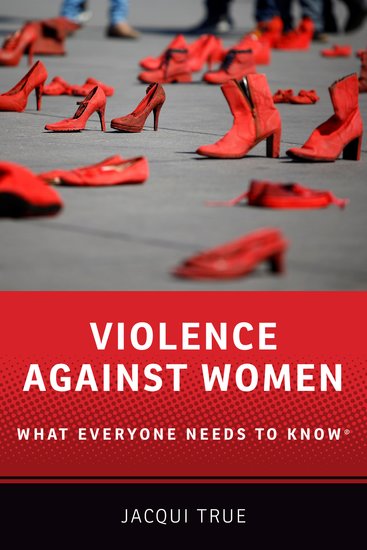Book Review: Violence Against Women – What Everyone Needs to Know

The 20th century saw unprecedented social changes which heightened women’s inclusion in public life. Jacqui True’s new book depicts the dark underbelly of gendered violence which continues to impact female emancipation.
Throughout the 20th century, the modern world witnessed unprecedented societal changes with regard to women’s access to education and participation in the workplace and politics. With women’s emancipation from the private sphere, further societal changes emerged, breaking down traditional gender stereotypes. These shifting gender paradigms have been instrumental for women’s empowerment in the public arena.
Regardless, misogyny and hatred towards women are still ongoing issues contributing to acts of violence towards women. Thus, eliminating global violence towards women and girls is one of the United Nations’ leading targets, however, there is still much work to be done. Although nations worldwide ratified the 1979 Convention to the Elimination of All Forms of Discrimination Against Women (CEDAW), the scourge of violence towards women continues mostly unchecked. Alarmingly, real figures of violence against women are still mostly unknown, making ending violence against women and girls a leading political challenge in the 21st century. Today, women from all nations, cultures, and creeds remain victims of violence, independently of their socio-economic background, or whether they live in the developed or the developing world.
Jacqui True’s new book, Violence Against Women: What Everyone Needs to Know, details the key impediments to ending violence towards women globally, notably the impact of patriarchal structures and how it shapes masculinities and femininities. True’s book is ambitious, providing a comprehensive account of the issue. Although still a problem worldwide, violence against women is increasingly gaining attention in the international area. This has, in particular, been demonstrated by the astounding success of the #MeToo movement to raise awareness towards women’s sexual harassment, now an issue widely diffused through social media. With the topic increasingly gaining international attention, it is paramount to foster greater discussion on the cultural, societal, political, legal, and structural causes contributing to violence against women, making this a timely book.
Violence Against Women is organised into four main parts, dissecting the complexity associated with this global phenomenon. The first part of the book provides an overview of the subject and definitions, with an overarching approach to the topic as violence against women and girls (VAWG). True contends this is an all-encompassing phenomenon. To explain this perspective, she details how views on what it means to be a man and what it means to be a woman are shaped during the early stages of children’s socialisation and are impactful on gendered violence towards women worldwide. In this section, True’s work unravels the historical struggles faced by women, from gaining voting rights to participation in the workplace and politics, and discusses ongoing challenges to break the glass ceiling in the developed and developing worlds alike.
In part two, Violence Against Women provides a comprehensive background of the root causes of VAWG from a sociological perspective. In True’s view, the formation of masculinities is key to understanding men’s views on women, as well as the normalisation of violence or its rejection. In her words: “Adapting Simone de Beauvoir’s famous expression with regard to achieving womanhood, one is not born, but rather becomes, a man.” True continues by arguing that societal demands for boys from a young age to “man up,” requirements to be accepted into manhood such as participation in violent contact sports, and the need to hide their emotions foster boys’ aggressive behaviour. She foresees this as shaping their masculinity and, later in life, their views regarding the opposite gender. Consequently, the normalisation of violence and aggression are seen as contributing to violent and dehumanising behaviours towards women during adulthood.
Part three of the book contextualises the relationship between structural inequalities and VAWG, addressing issues such as women’s lack of access to education and the environment, as well as international security perspectives on violence towards women. When delving into conflict-related VAWG, this book illuminates how gender can be utilised during war and conflict either to consolidate women’s societal oppression or conversely, to be channelled to break it. True’s mastery of this complex discussion is presented with clarity and elegance, making this reading accessible to experts in the field as well as the educated, non-academic public.
Beyond doubt, the book’s highlights are parts two and three. These lay down the foundations for a deeper understanding of violence against women as an overarching phenomenon embedded in sociological, as well as legal and structural, genderism. In part two, the chapter dealing with sexual harassment provides a holistic perspective by addressing violence against women through different angles. True highlights feminist legal theory scholar Catherine Mackinnon’s work, bringing to the discussion a sociological, international, as well as a legal approach to the topic. She maps out the socio-cultural factors and power structures in modern societies worldwide that are contributing to sexism and genderism, and discusses how these can affect VAWG. Her argument builds up from the formation of masculinities to broader cultural factors and gendered social structures and norms. This section explains how these continue to affect women’s employment, work conditions, and sexual harassment. In part three, although women in the developing world are the main focus, True highlights that structural causes of violence against women are pervasive in the Global North as well as in the Global South. She explains with nuance how the experiences of the Global North and South are, however, different due to various legal systems’ gender inclusiveness and other cultural factors. All these make this book thoroughly engaging and surprising on many levels.
True’s approach is courageous. She delves deep into gender studies discussions regarding the formation of masculinities and femininities, culture-related issues, as well as the role played by the media in reproducing women’s objectification and gender stereotypes, and how these broadly affect the condition of women. Through a legal feminist perspective, True explains how women’s employment conditions and job precarity feed into a cycle of violence.
In a nutshell, Violence Against Women sheds light on the impact of structural gender inequality in the phenomenon of violence against women and girls, an issue still underrepresented in the literature. The book is impressive in its content and structure. It is a compelling read, and towards the end of the book, there is a glimpse of hope. True’s holistic perspective on VAWG not only maps out key societal, structural, and legal issues underpinning the issue, it also brings forward solutions and discusses how new policy frameworks can pave the way for social transformation.
Is ending violence towards women a herculean task or just a matter of political will? Violence Against Women is laying out key foundations to answer this question. This book is complex and yet refreshing. It brings the contentious issue of violence against women to the forefront of the Australian and international academic debate. True’s work is indispensable reading for all those with an interest in gender and international relations, politics and gender, women’s rights, feminist theory, conflict studies, feminist legal theory, and women’s empowerment in the workplace.
This is a review of Jacqui True, Violence Against Women: What Everyone Needs to Know (Oxford University Press, 2020). ISBN: 9780199378944 (hardcover) & 9780199378937 (paperback).
Flavia Bellieni Zimmermann is a Teaching Fellow and Doctoral Candidate in Political Science and International Relations at the University of Western Australia. She holds a Bachelor of Laws with First Class Honours from the Pontifical Catholic University in Rio de Janeiro and a Graduate Diploma of International Relations and Security Studies from Curtin University, Western Australia. She is a Brazilian political analyst and has written extensively in this field. Her research interests include Brazilian politics and society, Latin American politics, populism and nationalism, women in the global south, gender, politics and religion.
This article is published under a Creative Commons License and may be republished with attribution.





